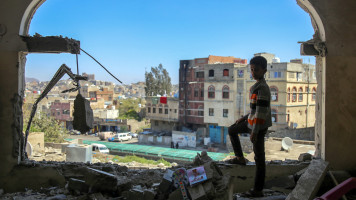Sudanese sanctions: The only choice, or a wasted opportunity?
President Obama extended US sanctions against Sudan for its 19th straight year on Monday. Executive Order 13067, prohibiting any and all transactions with Sudan, was originally passed on 3 November 1997, so what does the order call for and has it had any effect?
In the original order, President Bill Clinton quoted three main reasons for the sanctions, namely:
-
"continued support for international terrorism;"
-
"ongoing efforts to destabilise neighbouring governments;" and
-
"the prevalence of human rights violations, including slavery and the denial of religious freedom"
The order allowed the government to seize all Sudanese property in the US and to stop any interaction with Sudanese businesses or entities, whether commercial or otherwise. This order was then expanded by President George W Bush in 2006, who extended sanctions against anyone found to have damaged the peace agreement in Darfur.
International terrorism
Most experts believe that the real reason the US applied sanctions against Sudan was due to its support of various al-Qaeda elements.
A famous example of this being when Osama bin Laden was allowed to stay in Sudan between 1991 and 1996.
Fast forward to today and a lot has changed. According to the US state department: "Sudan's support to al-Qaeda has ceased, but elements of al-Qaeda and [Islamic State group]-linked terrorist groups remained active in Sudan in 2015."
It does not necessarily follow, however, that the sanctions were the main cause of this policy shift.
"The reality on the ground has proved that these measures [sanctions] do not have a negative impact on officials or on any elite group," said Idriss Jazairy, a UN special rapporteur for Sudan after an official visit in 2015.
"Their full impact is on innocent citizens and on a deepening of the gap in income distribution within the Sudanese society and between provinces."
Jazairy was reporting on the effects of sanctions on Sudan in the run-up to a renewal on sanctions in 2015. He found that the effects of sanctions on the country's poor was catastrophic, while the sanctions had barely affected the Sudan's leadership.
A 2005 review of Sudan's economy found that 13 Arab banks continued to operate in the country, despite the 'sanctions'. What was more, French bank BNP Paribas was fined almost $9 billion in 2014 for its continued trade with the Sudanese government, along with Cuba and Iran.
The Sudanese sanctions did not work, precisely because they were not policed properly and upheld strenuously. The government continued its policies in the country’s south and one of the world's most brutal, deadliest conflicts was allowed to burn.
Destabilising neighbouring governments
Sudan may not continue to support al-Qaeda (at least officially), but it is certainly responsible for its continued involvement in the civil war in the south of the country.
There have been allegations of chemical weapons used against civilians as part of an on-going terror campaign against the local population for the past 20 years. None of this has changed, despite the continued sanctions.
Seventy percent of Sudan's profits from exports come from gold. Sudan is now Africa's third largest producer of gold and it recently received funding from Russia to expand this production.
Companies from across the Gulf flock to Sudan in order to feed their ever-growing appetite for the reliable mineral which stays valuable even during the most uneasy times of economic upheaval.
The investment that floods into Sudan - and more specifically the Darfur region - from Russia and the Gulf negates the original purpose of the sanctions.
This is because, perhaps most disturbingly, the international sanctions do not even cover gold production.
In 2015, the UN security council met to discuss trade sanctions against Sudanese gold exports, noting its direct relationship to the on-going Darfur conflict. Conflict proliferated in the areas surrounding the gold mines.
The US, UK and other permanent council members wanted to see sanctions, but these were vetoed by Russia and China.
"Russia proved most unreceptive to the Panel's report, rejecting proposed compromise language that would have only "expressed concern" over the Panel's finding that "armed groups control artisanal gold mines in Darfur", said a spokesperson for the Enough Project, an NGO that campaigns for an end to violence in Sudan and Congo.
The Results
Sanctions have had an effect on Sudan, but not the effect that US policy-makers intended.
"The actions and policies of the government of Sudan continue to pose an unusual and extraordinary threat to the national security and foreign policy of the United States," said President Obama, as he announced the latest sanctions extension on Monday.
Sudanese gold production is expected to rise 30 percent this year. The country's unemployment and inflation rates are also expected to rise by comparatively large amounts as well. Education rates are down, foreign investment rates are on the up and the number of internally displaced people is going through the roof.
The sanctions have been a disaster because they only ever hit the poor whilst the targeted elite were allowed to evade the real effects.


